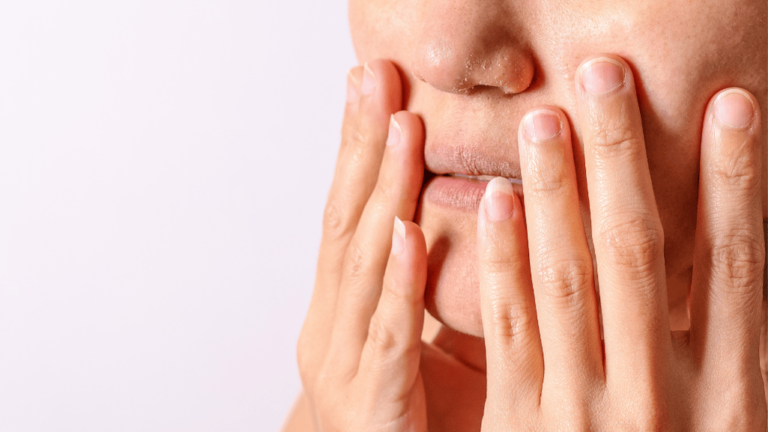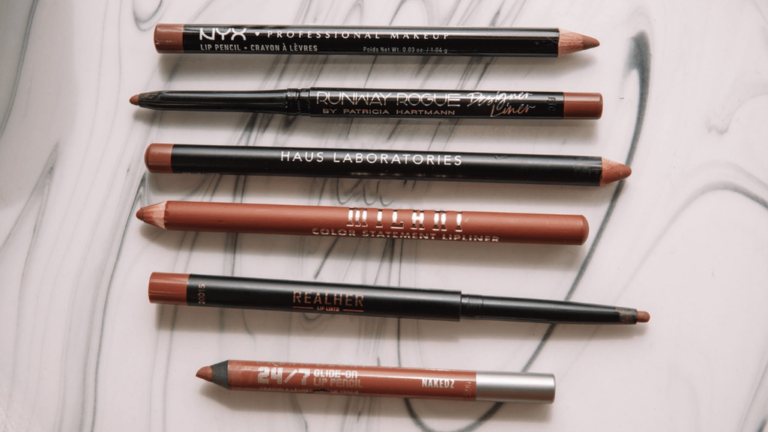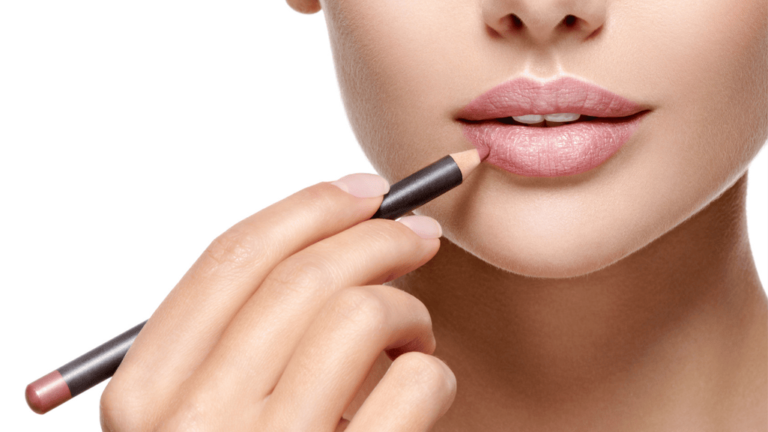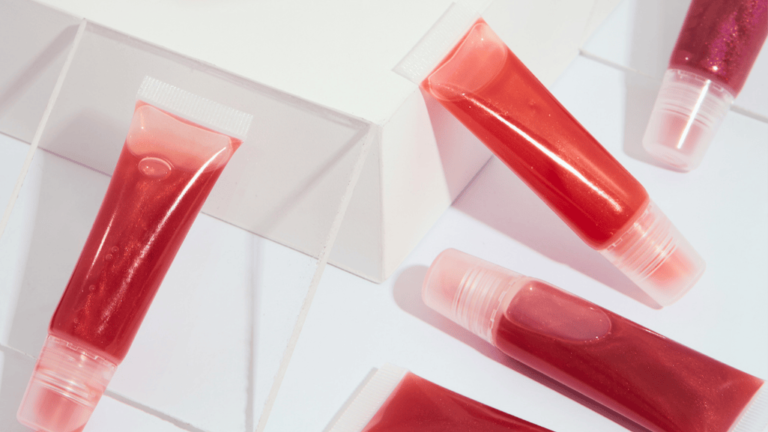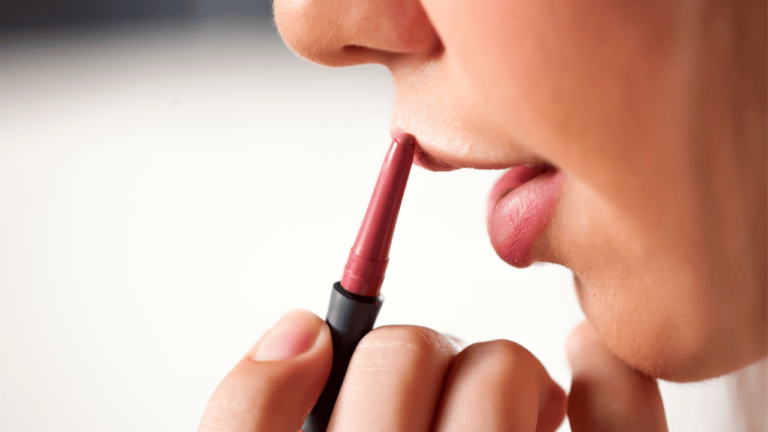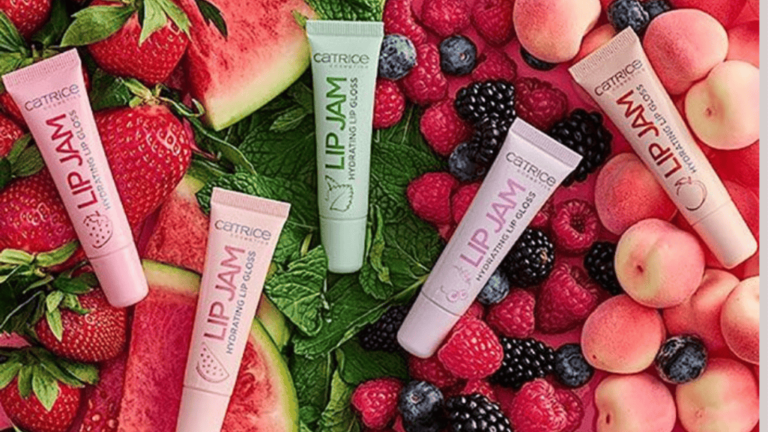Do you see bumps on your lips that look out of place? They could be a sign of an allergic reaction. Look out for symptoms like redness, itching, or a rash. These signs point to something in your food, makeup, or the environment causing a reaction. Finding the right treatment is important. There are many options from the store or from a doctor.
Taking good care of lips can help relieve these symptoms. But prevention is also key. Developing a daily lip care routine can keep allergens away. This helps keep your lips healthy and comfy.
Key Takeaways
- Spot symptoms and causes of lip bumps early for the best care.
- Remember, allergies can come from foods and beauty items.
- Use both store-bought and doctor-prescribed treatments for the best results.
- Do daily care to stop symptoms from coming back.
- Avoid things you know you’re allergic to.
Get help fast if severe symptoms show up like breathing trouble or quick swelling.
- Talk to a doctor for advice that’s right for you.
Introduction to Allergic Reactions on Lips
Allergic reactions on the lips can be worrying. They range from a mild rash to severe swelling. It’s essential to know what causes these reactions. Often, it’s things we use or eat every day.
For these reactions, using both home and medical treatments is best. Knowing what helps can make the pain go away safely and fast.
- Home Remedies: You can use simple things like cold compresses or lip balm to help.
- Medical Interventions: If the symptoms don’t go away, a doctor might suggest medicines like antihistamines.
For those who often deal with lip allergies, understanding them is key.
Identifying Allergic Reaction Bumps on Lips
It’s important to know the lip allergy symptoms for spotting and treating allergic reactions right. When you see bumps on the lips, it might be the first sign. These bumps can cause a little discomfort or be a serious problem needing quick help.
Common Symptoms and Presentation
Bumps from an allergy on the lips often look red and swollen. They can also feel sore or itchy. You might notice the skin around the lips is dry, peels, or is rough.
For some, these reactions lead to blisters or bumps filled with pus. These symptoms change based on what caused the allergy and how sensitive the person is.
Types of Allergic Lip Reactions
Many allergic issues can show up on the lips, which makes them hard to diagnose and treat. Allergic contact cheilitis (ACC) shows up because of beauty products or dental items. It looks like eczema and can make lips itchy or inflamed.
Angioedema can cause deep swelling under the skin, sometimes making it hard to breathe. This happens quickly and could be dangerous. Oral allergy syndrome affects the lips after eating certain foods, like fruits and nuts, that can act like pollen in the body.
Knowing the different types of allergies is important for the right treatment. Treatment might include avoiding allergens or using medicines like antihistamines. Because symptoms can be similar, getting a professional’s opinion is critical for good health care.
Common Allergens That Affect the Lips
Finding the main allergens is key for people with lip rash allergy. This includes food and skincare items. They can often cause discomfort and need specific care.
Food Allergies and Oral Allergy Syndrome
Foods like nuts, dairy, and shellfish can lead to lip irritation. For some, it can be severe, causing Oral Allergy Syndrome (OAS). Pollen allergy sufferers might find eating certain raw fruits and veggies makes their lips itch or swell.
Skincare and Cosmetic Ingredients
Skincare items and cosmetics with preservatives and fragrances can cause allergic contact cheilitis. Common culprits are propylene glycol, fragrances, and metals. They can make symptoms worse.
Lip rash allergy sufferers must watch for common irritants in personal care items. Here’s a list of allergens in lip items to avoid:
| Ingredient | Potential Allergic Reaction | Product Types |
|---|---|---|
| Castor Oil | Can cause lip irritation and swelling | Lipsticks, lip balms |
| Shellac | May trigger contact cheilitis | Lip gloss, some long-lasting lipsticks |
| Colophony (Rosin) | Might induce redness and irritation | Lipsticks, mascara |
| Fragrance/Flavor | Common cause of allergic reactions on lips | Lip balms, lip glosses |
| Metallic compounds (e.g., Nickel) | Known to cause allergic dermatitis | Colored cosmetics |
Choosing allergen-free products helps lessen lip irritation. It’s smart to avoid these irritants in food and skincare. This can lead to healthier lips and less problems.
When to Seek Medical Attention for Lip Swelling
Feeling your lip swell from an allergy demands quick action. It might signal anaphylaxis, a dangerous condition. Seek emergency help for severe swelling, trouble breathing, or if it’s near pus-filled blisters. Also, if you feel numb or a tingling around your lips, get help fast.
An immediate shot of epinephrine is key to fighting anaphylaxis. Waiting for treatment can make things worse or even deadly. So, a fast reaction to a severe allergic reaction on your lips is essential.
- Difficulty breathing or wheezing
- Persistent hives or swelling after antihistamine use
- Painful, pus-filled blisters on or around the lips
- Numbness or tingling in the facial region
If swelling doesn’t go down with normal drugs or these severe signs show, visit a doctor now. An allergist can help with a special allergic reaction treatment for your lips. When it’s anaphylaxis, acting quickly is crucial. It can save a life.
Treatment Options for Allergic Reaction on Lips
Having an allergic reaction on your lips is tough. But knowing what treatments are available can soothe your stress. We’ll look at different ways to treat allergic reactions on the lips, from drugs you can buy over the counter to things you can do at home and professional help.
Over-the-Counter Medications
For a quick fix, try things like antihistamines and corticosteroids you can get without a prescription. Hydrocortisone cream is a good pick. It fights swelling, itchiness, and redness well. Just make sure to use it as directed to avoid making things worse.
Prescription Treatments and Therapies
Sometimes, over-the-counter help isn’t enough. You might need special meds that only a doctor can give you. Doctors might give you things like tacrolimus ointment if your symptoms are bad. For really serious cases, they could suggest sublingual immunotherapy. This treatment helps your body get used to the stuff it’s allergic to over time.
Home Remedies and Self-Care Practices
There are a lot of ways to make yourself feel better at home. To help with swelling, try using something cold on your lips. And don’t forget to put on lip balm to keep them soft and smooth. Here are some tips that can help:
- Drinking a lot of water can keep your lips healthy
- A humidifier can help if the air is dry
- Avoid things that make it worse, like biting your lips or using lip products that have strong smells or preservatives
By taking good care of your lips when you’re having an allergic reaction, you can get better faster. This care can also help keep bad effects away.
The Role of Immune System in Lip Allergic Reactions
The immune system plays a key role in allergic reactions that affect the lips. It can react strongly to things that are not normally harmful. This causes symptoms like lip swelling. These reactions are the body’s way of fighting off what it thinks is dangerous. But, sometimes the immune response is too strong, leading to health problems.
Understanding Angioedema
Angioedema shows up as sudden, significant swelling, often from allergic reactions to lip products. It’s crucial to recognize this condition and treat it right. Swelling usually happens around the eyes and lips. It can also affect the hands, feet, and throat.
Factors Contributing to Immune System Overreactions
Some people are more likely to have strong immune reactions because of their genes. Also, coming into contact with allergens in the environment can set off these reactions. Common things like foods, bug bites, and even certain medicines might lead to severe immune responses. This can cause a range of symptoms from minor discomfort to serious health risks.
| Allergen Type | Common Examples | Typical Immune Response |
|---|---|---|
| Food | Nuts, shellfish | Immediate swelling and possibly anaphylaxis |
| Lip Care Products | Certain balms, lipsticks | Localized swelling, itching, contact cheilitis |
| Environmental | Pollen, pet dander | Respiratory symptoms, lip swelling from allergic reaction |
The immune system is crucial in how our body deals with allergens. Knowing this helps in finding the right allergic reaction treatments for the lips. This knowledge can prevent severe reactions. It also speeds up the healing process and increases comfort.
Preventative Measures to Avoid Allergic Reaction on Lips
Preventing allergic reactions on your lips is key. To do this, you should know what can cause these reactions. Creating a lip care plan that fits your needs is a smart move to stay safe and comfortable.
Using special lip products designed not to cause allergies helps a lot. They lower the chance of facing reactions from common allergens in regular lip care items.
- Choose products without harsh chemicals and dyes, which can trigger reactions.
- Regularly moisturize with balms containing nurturing oils like shea butter or hemp seed oil to maintain lip barrier integrity.
- Conduct patch tests with new products to ensure they are safe before regular use.
Adding an at-home allergy test can make your lip care even safer. It helps spot substances that could cause issues. This way, you can make your lip care routine better for your health.
| Allergen | Common Sources | Alternative Choices |
|---|---|---|
| Fragrances | Lipsticks, glosses | Fragrance-free products |
| Preservatives | Lip balms, creams | Products with natural preservatives |
| Metallic Salts | Colored cosmetics | Organic or mineral-based makeup |
| Propylene Glycol | Moisturizers, balms | Products with glycerin or aloe vera |
Remember to watch out for environmental and food-related triggers too. Keeping a strong lip care plan helps. This keeps your skin healthier and less prone to allergic reactions.
Allergic Reaction Lip Care and Management
If you have lip allergies, picking the right lip care items is key. You need products that ease symptoms and don’t make them worse. There are many choices meant for people with allergies. They focus on calming and feeding your lips without any added problems.
Importance of Mild and Non-Irritating Lip Products
It’s crucial to use gentle lip products if you often get allergic reactions. Go for items made without harsh chemicals or things you’re allergic to. These can stop issues like redness, swelling, and itching. Make sure your lip balm is free from scents, colors, and preservatives. These often cause allergy symptoms.
Allergic Reaction Lip Balm Options
Choosing the right lip balm is essential. Look for hypoallergenic options. These lip balms use simple, calming ingredients like petrolatum, shea butter, or coconut oil. They moisturize and fix your lips without causing an allergy. If your symptoms are bad, you might need a balm with mild corticosteroids to reduce swelling and pain.
Knowing what you’re allergic to can help you pick the best lip balm. Here are some good choices:
- Burly Chap’s Organic Beeswax Free Balm – Perfect for people allergic to propolis or beeswax
- Pure Veda Unscented Lip Care – Has no fragrances or essential oils, which often cause irritation
- SoftLips Pure Hypoallergenic Balm – Made for sensitive skin, with no irritating extras
Choosing the right products is crucial. It’s how you can effectively handle and avoid symptoms from lip allergies.
Conclusion
We’ve looked deeply into allergic reaction bumps on lips. We now know a lot about how they look, why they happen, and what leads to them. It’s crucial to recognize the signs of lip allergies. This way, we can treat them right and on time.
About a quarter of people in India face different types of allergies. This makes it very important to watch out for things like lipsticks or lip balms. These products can cause problems for people who are sensitive to them.
Sometimes, lip swelling from an allergic reaction doesn’t show up right away. It can start hours after touching something you’re allergic to. This is called delayed hypersensitivity. A rare condition called stomatitis venenata can also happen. It shows with very serious symptoms. This all tells us to be careful and get help if we need it.
So, how do we stay safe from allergens? The key is avoiding things we’re allergic to. We should pick lip products that are gentle. And, if our symptoms get bad, we must see a doctor. With this approach, we can protect our lips and avoid the trouble that comes with allergies.







